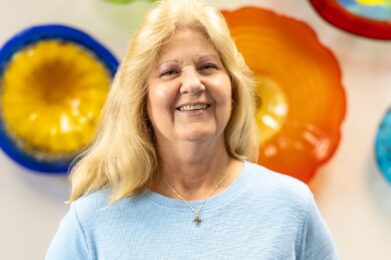Figuring out how to pay for the cost of care in the nursing home can be both stressful and confusing. When one spouse needs nursing home care, covering the costs can have a devastating impact on the well spouse’s finances. Paying for care without impoverishing the spouse who is living at home can be quite difficult. Provisions in the federal law do protect the spouse not living in the nursing home or not receiving Home and Community-Based Services (HCBS). The Division of Assets is a common reference to Medicaid’s spousal impoverishment laws.
*This blog is for educational purposes only and should not be considered legal advice. The use of the Paths Law Firm website does not constitute a client-lawyer relationship.
To provide a better understanding of how to protect against impoverishment it’s important to understand the terminology.
Definitions
- “Community Spouse” identifies the spouse of a person who receives Medicaid benefits for long-term care services such as care in a nursing home facility, or is receiving services through a Medicaid Waiver such as Home and Community Based Services (HCBS).
- “Institutionalized Spouse” identifies the spouse that has applied for long-term care services through Medicaid. This can also refer to the one who receives services at home through a Medicaid Waiver.
- “Spousal Impoverishment Law” references laws in place to help ensure the community spouse has adequate finances. Without this law, Medicaid combines all income and assets for both of the spouses and considers them as belonging to the spouse applying for Medicaid benefits. This means the married couple would be required to spend all financial resources on care. In turn, this could make the community spouse unable to financially support themselves.
- “Community Spouse Resource Allowance” or CSRA identifies the amount of total assets the community spouse can keep.
- “Minimum Maintenance Needs Allowance” or MMMNA identifies the amount of income the community spouse should have. The law provides a minimum and a maximum. If the community spouse does not have the requisite amount, some of the institutionalized spouse’s income may be attributed to the community spouse and not to the nursing home. This amount can be affected by housing costs as well as several other factors for which allowances are set.
- “Countable Assets” are a married couple’s assets which are not exempt from determining the starting amount before the division of assets. Countable assets can include money market funds, life insurance cash surrender value, checking accounts, savings accounts, CDs, stocks, bonds, second cars, secondary homes, and many other items.
- “Exempt Assets” are assets that are not counted to determine Medicaid eligibility. This includes a home (depending on value), personal belongings, household items, one vehicle, burial plans, and burial plots. However, this does not mean those assets are exempt from reimbursing Medicaid later.

Below is a more in-depth look at the Division of Assets and the rules associated with this law.
What is a Division of Assets?
Division of Assets, also known as the Spousal Impoverishment provisions of the Medicare Catastrophic Coverage Act of 1988, is a vital law applying to married couples. The primary intent was to modify requirements for Medicaid eligibility when one spouse requires nursing home care and the other spouse remains in the community. The primary intent of the law is to prevent impoverishment for married individuals with deteriorating health statuses. You may also refer to it as the process under the Missouri Medicaid Program ascertaining the amount the community spouse can retain. This process came to be in 1988 from the Spousal Impoverished Act. The goal of this provision is to ensure the spouse, not in a care facility, does not fall into poverty. The latter is referred to as the community spouse whereas the spouse in nursing care is considered an institutionalized spouse. A Division of Assets provides a married couple the ability to set part of their assets aside. This is called the “spousal share.”

How Are Division of Assets Calculated?
The community spouse is limited by the total value of the countable assets (resources) they can own. This is known as the Community Spouse Resource Allowance. The Division of Assets is calculated by first totaling the couple’s countable assets. The non-countable assets, or exempt assets, are the couple’s home, a car, personal belongings in use, and some others usually of lesser value. In Missouri, the spousal share is comprised of whatever assets the spouse chooses of which the value is one-half of the total countable assets. So, if a couple’s total countable resources total $200,000, the CSRA is $100,000.
However, there are limits to the CSRA. For 2020, the minimum CSRA is $25,728. An example of this would be if a couple’s countable resources total $35,000, the CSRA is the $25,728. If that were the case, the institutionalized spouse is considered having $9,272 ($35,000 minus $25,728). The maximum CSRA is $128,640. So, anytime the couple’s total countable resources are over $257,280, the CSRA is capped at $128,640 and the institutionalized spouse is considered having the total countable resources over the $128,640.
The CSRA does not remain constant. It fluctuates due to inflation and the cost of living; hence, it is periodically adjusted. The calculation for the allowance commences once the institutionalized spouse begins the period of institutionalization. The Date of Institutionalization (DOI) is when they are admitted to a hospital, nursing home, or other health care facility and such continues for at least 30 days.
If the amount defined as the “spousal share” seems to be inadequate to support the community spouse, it is important to discuss this with a qualified attorney. There are Spousal Impoverishment provisions allowing increases in CSRA or other ways to convert or protect the share attributed to the institutionalized spouse.

Preventing Spousal Impoverishment
Allotment of Income
A provision allows an institutionalized spouse living in a nursing home to give some of their income to their community spouse and dependents. This transfer is supposed to be automatically calculated by the Medicaid eligibility specialist when the community spouse’s income is below a specific limit, known as the Minimum Monthly Maintenance Needs Allowance (MMMNA). The MMMNA is currently $2,155. If the community spouse’s income is below the MMMNA, the difference is made up from the income of the spouse who is in the nursing care facility.
Similar to the CSRA, the MMMNA also has a maximum. The community spouse may be able to transfer income from the institutionalized spouse so the community spouse’s income can get up to $3,217 in the 2020 calendar year with Medicaid approval. One way of increasing the monthly maintenance needs allowance is by proving expenses exceed certain allowances. Most people don’t know though, the law actually provides the MMMNA can exceed the maximum “per court order.” An experienced elder law attorney can further discuss this option with your family.

Division of Assets
As discussed earlier, the Division of Assets will help prevent the community spouse and dependents’ impoverishment by protecting their resources. It will also serve the same purpose when one spouse does not get the Home and Community-based Services. It is important to inquire about the division of assets if one spouse is admitted to a nursing care facility or has requested the HCB services despite not wanting to apply for MO HealthNet coverage later in life.
What is Allotment of Income?
If an individual is living in a nursing home, receiving Medicaid, and has been approved for vendor payments, the allotment of income provision permits some or all the institutionalized individual’s income to be set aside for their spouse who is not in the nursing home. The amount varies based on the situation and limits set by law. For more information on 2020 MMMNA for a community spouse, see the Adult Standards chart.

Who Is Eligible for Allotment of Income?
The eligibility for the Division of assets, states you must be:
- married, and
- in a nursing care facility with the expectation of being there for a minimum of 30 consecutive days and whose spouse is not in a nursing care facility,
- or you have requested HCB services and your spouse does not want HCB services.
To designate an allotment of income to a community spouse or their dependents, you are eligible if you are:
- in a nursing care facility with the expectation of being there for a minimum of 30 consecutive days;
- are approved for vendor payments
- your dependent(s) or spouse is not in a nursing care facility; and
- your dependent(s) or spouse’s income is below the Minimum Monthly Maintenance Needs Allowance (MMMNA) determined.

What is Medicaid?
Medicaid is a program providing health care coverage to over 72 million people in the United States. The Medicaid program began in 1965 along with Medicare and has provisions in all 50 states as well as in the District of Columbia and the US territories. The program includes coverage for low-income individuals, women who are pregnant, children, individuals with disabilities, and the elderly.
Each state administers its program to ensure citizens with low income get medical services. The Missouri Medicaid program is administered by MO HealthNet. The program helps to limit enrollee out-of-pocket costs and covers numerous health and long-term care services. Over the years the program has evolved and continues to do so to meet the ever-changing health care needs. It is financed by the federal government and states to ensure the process runs smoothly.
How is Medicaid Eligibility Determined?
Medicaid Eligibility rules differ from state to state and the process to apply and qualify can be extremely complex. For those that are elderly Medicaid has two primary requirements, financial and functional. In regards to finances, Medicaid looks at the income of the applicant and may also look at the assets and income of the spouse. Functionally, the applicant must have medical needs requiring a nursing care facility. To better understand Nursing Home Medicaid and the eligibility factors involved, refer to our blog “Nursing Home Medicaid for The Working Class”.

What Are the Rules Associated with the Division of Assets?
The rules of Spousal impoverishment are federal Medicaid regulations set forth to prevent the spouse of an applicant from being poverty-stricken so that their spouse may qualify for long-term care Medicaid. Before the “Spousal Impoverishment Protection” law of 1988, often the spouse of a nursing home Medicaid recipient was left unable to pay for necessities such as food, rent, and medications. To qualify for Medicaid a large portion of a married couple’s assets and income were required to be put towards the cost of paying for nursing home care. Today, spousal impoverishment rules include a minimum monthly maintenance needs allowance (MMMNA) and a community spouse resource allowance (CSRA). These allowances help to help protect part of the couple’s assets and income to prevent the impoverishment of the spouse of the applicant.
The relevance of Spousal Protections
Originally the spousal protections program was specifically for spouses of Medicaid nursing home applicants. In 2014 the Affordable Health Care Act, section 2404, extended the rules to include married couples when one spouse is applying for Home and Community-Based Services (HCBS). These new rules were supposed to expire in November of 2018 and were then extended to expire November 30th, 2020. If no extension is granted, each state will determine whether they will apply spousal impoverishment rules to HCBS Medicaid waivers.
If the congress lets Section 2404 expire, some states will quit using the spousal impoverishment protections. Without the waiver to offer protection to the non-applicant spouse’s income and assets, married couples will have to pay more out of pocket for long-term care. Even without the protections, Nursing home Medicaid will still allow non-applicant spouses to protect part of their assets and income.

Assets Exempted in Division of Assets
A major concern for many married couples is which assets are exempt, in particular their homes. Exempt assets include the primary residential home if you or your partner are living there. A vacation home is not exempt and is counted as part of Medicaid asset limits. For exemption purposes, there is a home equity value limit. The latter refers to your home’s market value subtracting the debt against it. The equity value cannot go beyond $595,000 in Missouri.
Note, if your spouse lives there and is not a Medicaid applicant, there will not be any equity value limit. Additional assets considered exempt include personal belongings, household items including appliances, furniture, clothing, jewelry, burial plots, funeral plans, and one vehicle of unlimited value. Also, exempt assets may include life insurance policies with a cash value not more than $1,500 in Missouri. However, this limit can be the combined face value of a multitude of small life insurance policies. Determining whether you are over the Medicaid asset limit and by how much can be difficult.
How Can an Elder Law Attorney Help Navigate the Process of Dividing Assets?
The process of dividing assets can be challenging. With the help of a reputable and competent elder care attorney, the process will undoubtedly be much easier and less stressful. An experienced attorney understands the complexities of navigating eligibility guidelines and can help you work through the process to meet specific financial requirements. Applicants with few assets tend to qualify much more quickly, while those with considerable assets may take more time to qualify or may not qualify. If your income and assets are in the middle, you may need to spend down some assets, although a qualified elder care attorney can assist you in minimizing or eliminating the requirement and preserving assets and income. Choosing an experienced elder law attorney provides you with the benefit of knowledge and expert help to maneuver the planning and application process. Your attorney will walk you through the process, work with you on how to handle your assets, and when you can transfer them.
At Paths Elder Law, we are here to help you through the process of applying for Medicaid to get you qualified and help determine the Division of Assets. Seeking the advice and guidance from an expert in Medicaid laws could save you from spending your life savings on the cost of care. If you are married and either you or your spouse need nursing home care contact Paths Elder Law. Our caring staff is here to help you.

























